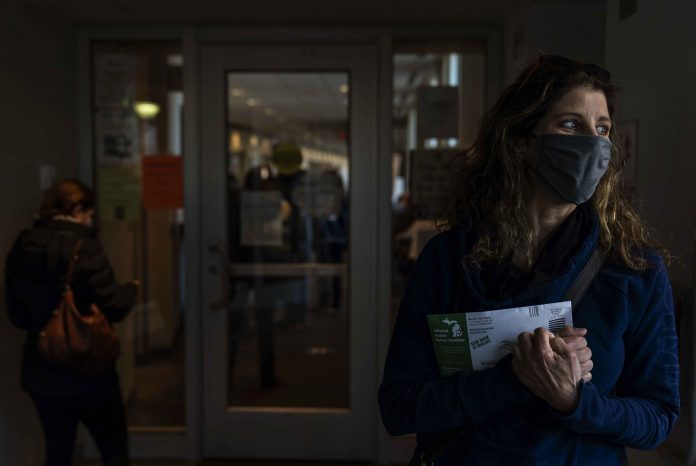She could have dropped her ballot at the post office, but she wasn’t sure if she should trust the mail. She considered slipping it into the secured box outside City Hall, but what if something happened? A fire maybe.
This year has delivered so many shocks that anything seemed possible. So 58-year-old Diane Spiteri trudged up three flights of steps to place her absentee ballot straight into the hands of the clerk in this battleground suburb of Detroit.
As the traditional Election Day closes in, Americans are exhausted from constant crises, on edge because of volatile political divisions and anxious about what will happen next. Their agony is not in deciding between President Donald Trump or his Democratic challenger, Joe Biden. Most made that choice long ago. Instead, voters arriving in record numbers to cast early ballots say basic democratic foundations feel brittle: Will their vote count? Will the loser accept the result? Will the winner repair a sick and unsettled nation?
“I just can’t wait until the whole thing is over. And I think it’s long from over, even after Tuesday. There’s just so much anxiety,” said Spiteri, who voted last week for Biden. “I am hoping that there wasn’t too much damage done in the last four years that it can’t be undone.”
Here in Macomb County and across the country, some have obsessively tracked polls to soothe their nerves, or bought guns, or researched moving abroad, or retreated to a cabin in the woods. Tension has ratcheted up, as each side believes the other is threatening to usher in the end of America as we know it.
“Our country is in a state of chaos,” said Roberta Henderson, as she deposited her ballot in Sterling Heights, Michigan. She voted Trump in 2016. But she grew tired of his divisiveness. This time, she voted for Biden.
A nation already uncertain about its future amid a worsening pandemic and a national reckoning on racism is now contemplating the added threat of clashes in the wake of Election Day.
In Texas, vehicles festooned with Trump flags swarmed a Biden campaign bus. Weeks ago, a group of men were arrested for allegedly plotting to kidnap Michigan’s Democratic governor. Gun sales have skyrocketed. Trump refused to promise a peaceful transfer of power.
About 7 in 10 voters say they are anxious about the election, an AP-NORC poll found. Biden supporters were more likely than Trump voters to be nervous — 72% to 61%.
But Trump’s supporters, too, said they feel a sense of dread. The president has warned that if he loses crime would consume the streets and freedom would buckle under political correctness.
“If we let that other guy in, all hell is going to break loose,” said Dan Smith, 53, in Norfolk, Virginia. He’s supporting Trump because he’s concerned about “law and order.”
As the coronavirus crisis surges to more than 230,000 dead, the election for many is a referendum on how Trump has handled the pandemic. Many of his supporters say they find no fault in his response.
In New Albany, Ohio, Jason Baker, 44, said that he and his family all had COVID-19 two months ago, still he voted for Trump. He believes the pandemic has “been highly politized to the point where it’s disgusting.”
But Theresa McGarity in Mount Clemens, Michigan, lost her mother to COVID at 76 years old.
“I guess because it hit home, it’s not political anymore. It’s a plain, simple right and wrong,” said McGarity, who voted for Biden. “When someone in leadership is aware of something that could flip your whole world upside down and they don’t inform you. And you have the right to vote to change that, shame on you if you don’t.”
Trump has alleged that widespread absentee voting will lead to fraud, though there is no evidence to support that claim.
In Macomb County, Terry Frandle plans to vote in person on Election Day.
“I just don’t trust anything anymore,” he said.
He hung Trump banners outside his house and noticed neighbors who used to stop to chat crossed the street. He doesn’t blame Trump for the discord — he blames the media for failing to give Trump a fair shake, he said.
On the other side of the aisle, too, people are grappling with political tension.
In the Chicago suburbs, Phyllis Delrosario, 73, said her mood vacillates from excitement to depression. She researched moving to another country if Trump is reelected.
“I just feel like I’m this raw exposed nerve all the time, and the anxiety of all this and the chaos of ‘what’s he going to destroy next?'” she said.
Trump at a recent debate declined to clearly condemn white supremacy. He told a far-right group to “stand back and stand by.”
As a Black woman, Charlotte Moss, 64, of Oakland County, Michigan, had become increasingly concerned about emboldened militant groups.
She had never owned a gun, but about a month ago, bought one. She took a class at the Detroit chapter of the National African American Gun Association. Chad King started the club in 2017, and it’s grown to 210 members. In the weeks before the election, he scheduled two courses on deescalating tense situations. They sold out in three days.
Michelle McDonald got chills when she submitted her early ballot for Biden in Macomb County last week.
She was anxious as she walked into the clerk’s office, but as she walked out she felt something different: hope.
“I did my part,” she said. “I have faith that no matter what happens things are going to get better. God has us all.”




















